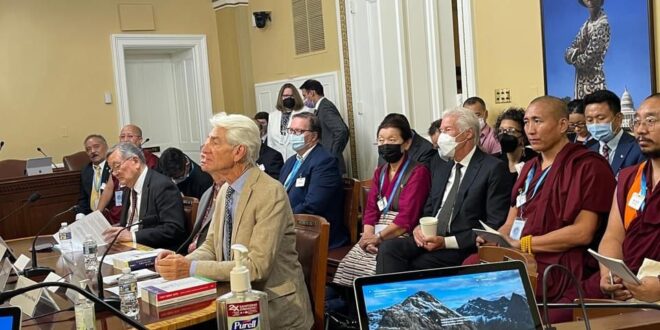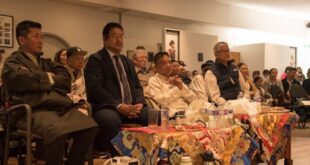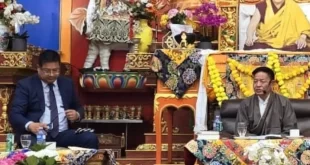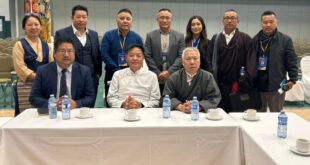Staff Reporter
June 24, 2022
Subscribe
Tibet: Barriers to Settling an Unresolved Conflict
Dharamshala: The Congressional-Executive Commission on China, constituted by Congress with the legislative mandate to monitor human rights and the development of the rule of law in China, held a hearing on ‘Tibet: Barriers to Settling an Unresolved Conflict’ to discuss the ongoing barriers to the resumption of a dialogue that could serve the aspirations of the Tibetan people for human rights and put an end to restrictions on religion, culture, and language. The hearing also explored aspects of Tibetan history and international law that undergird His Holiness the Dalai Lama’s desire for a peaceful resolution to the conflict between Tibet and the People’s Republic of China, and examined how US policy can support the aforementioned goal.
Professor Michael van Walt van Praag (Executive President of Kreddha), Professor Hon-Shiang Lau (Retired Chair Professor at City University of Hong Kong), Kalon Trisur Tenzin Namgyal Tethong (Former CTA official and Representative of His Holiness the Dalai Lama to North America) and Ellen Bork (American Purpose contributing editor) presented their testimonies before the hearing presided by Senator Jeff Merkley and Senator Jim McGovern.
Following the succinct remarks on China’s restrictive and manipulative policies imposed inside Tibet from the Senator Merkley, Senator Jim McGovern briefed the US Congress’ engagements and initiatives in elevating Tibet’s status while expressing its abiding interest in resumption of the Sino-Tibet dialogue saying “the US government has consistently called on the Chinese to return to dialogue without preconditions. But that hasn’t worked. For 12 years, the Tibetans stood ready, the Americans asked, but the Chinese turned away.”
Professor Michael van Walt van Praag presented his testimony based on the findings of ten years of collaborative research appealing to international communities to withdraw their acceptance of Tibet as a part of China, saying it “takes away the PRC’s principal incentive to negotiate with the Tibetans as well as reduce the latter’s main source of leverage.” He further said the acceptance limited conducting international scrutiny and reproach towards Beijing since it compelled the international community to treat Tibet as an internal issue of China. By contrast, he said, “our research firmly establishes that though not always ‘independent’ in the modern legal sense of that term and over time subject to various degrees of Mongol, Manchu and even British authority or influence, Tibet was most certainly never a part of China. The PRC could, therefore, not have ‘inherited’ Tibet from the Republic of China or earlier empires, as it claims. As a matter of fact, Tibet was an independent state de facto and de jure from 1912 to 1950/51, when the PRC invaded it.”
Hence, Professor Michael van Walt said, “supporting a negotiated resolution of the Sino-Tibetan conflict requires the political will to be vocal about the lack of legitimacy of China’s presence in and rule of Tibet, not statements that imply an acceptance of China’s claim to sovereignty over Tibet. It requires calling and treating Tibet what it is: an occupied country, and the Tibetans what they are: a people under alien subjugation and domination, not a ‘minority’ or ‘ethnic group of China’. Adopting such PRC terminology denies the Tibetan people its proper status and implicitly its right to self-determination. And lastly, it requires the Sino-Tibetan conflict to be called and treated what it is: an international conflict, falling squarely within the international community’s—including the US government’s—purview and responsibility, not China’s internal affair” in his testimony. He further recalled President Joe Biden’s reiteration of US policy of not recognising a country’s attempt to annex territory by the use of force in reference to Taiwan and Ukraine.
By bringing the official maps of the Ming and Qing dynasties depicting Tibet as a non-China foreign entity, Professor Hon-Shiang Lau expounded the indication of Tibet as sovereign in China’s pre-1949 official historical records as his theme. As a signatory to the relevant covenants of the League of Nations and the United Nations; which means that, since 1919, China has promised not to gain territories through military conquest thereafter, along with PRC’s incessant condemnations to other countries for their past colonial conquests and their past “bullying” of China, Professor Lau said “PRC needs to cover up its 1950 Tibet conquest as a “unification” of a territory that has been “part of China since antiquity.”
Addressing the two important foundation concepts behind his theme, namely the extensive dissimilarities between the PRC-version of “Chinese history” and the actual Chinese history and examinations of the official classical Chinese records, Professor Lau highlighted that the PRC’s evidence of sovereignty over Tibet is based on not only distortions but outright fabrications and forgeries of pre-1949 Chinese records.
Panellists and attendees during the hearing on Tibet titled ‘Barriers to Settling an Unresolved Conflict’
The third panellist Tenzin Namgyal Tethong briefly spoke on the Tibetan-Chinese relations in the 20th century, including efforts toward the resolution of Tibet issue at the hearing. Recounting PLA’s invasion following Mao’s takeover of China and the subsequent efforts of Tibetan government in seeking international and UN supports in defending its autonomy, he said, “China knew right then that rhetorical justification for such an invasion was not enough and called for negotiations to formalised an agreement” eventually materialising the 17th Point Agreement in which Tibetan representatives signed under duress. Despite Tibet’s attempt to work within the broad confines of the agreement during the next few years, China didn’t level up the commitments and nor did the personal assurances that His Holiness the Dalai Lama received from the Mao, ultimately causing the omnipresent dissatisfaction amongst the Tibetan and culminating the protest into an uprising of 10 March 1959.
Tenzin Namgyal Tethong further said the incident led to an exodus of His Holiness and Tibetans into exile while Tibet was completely shut off by PRC from the outside world’s reach. However, he continued, “in early 1979, China deemed the Tibetan issue important enough to be revisited. Deng Xiaoping invited the Dalai Lama’s older brother to Beijing and declared that short of separation, everything could be discussed”. This breakthrough meeting led to renewed dialogue between His Holiness the Dalai Lama and the Chinese government. The communication was again restored in 2001 following the decades of recess; the Tibetan delegates then presented the Middle Way Approach at the meetings even after the 2008 Tibet-wide protest to till China’s termination of the dialogue process in 2010. With this overview in mind, it shows that “even at the most challenging of times, China has seen the need to address the legitimacy of their rule in Tibet. And that there is perhaps now a realisation on the shortcomings in their rule,” “China has also repeatedly initiated direct communication with His Holiness the Dalai Lama demonstrating the obvious need to find a meaningful resolution to these outstanding issues”. He, therefore, urged for continuous efforts and support from the US and others to resolve the Sino-Tibet conflict through negotiations.
Even with Americans’ little concerns over the Tibet issue, Ellen Bork virtually testified that “Tibet remains a high priority for the Chinese Communist Party. This priority is evident in the attention and resources the Party devotes to surveillance, repression and control, to General Secretary Xi Jinping’s goal of Sinicizing religion, to the exploitation of natural resources and to building up military forces along Tibet’s border with India”.
Given the constant changes in United States’ approaches in dealing with the Tibet issue, Ellen Bork recommended renewed and redoubled support for Chinese and Tibetan political prisoners, dissidents, democracy activists, independent journalists and lawyers. She also suggested conducting an independent review of US Tibet policy since the end of Chinese imperial rule, including the diplomatic history and internal deliberations that have influenced America’s approach to Tibet and bringing Tibet policy into line with America’s interest in combating China’s assault on democratic norms, including international law, and in advancing democracy in the Indo-Pacific by enlisting allies in a united position on the integrity of the Tibetan process for selecting the next Dalai Lama.
Furthermore, she urged US to receive elected officials of the Central Tibet Administration (CTA) at the highest levels of government and include them in the Summit for Democracy and other gatherings, at the same time making Tibet a part of efforts to counter Chinese influence in international organisations, on university campuses and at the state and local level.
The hearing was concluded with an hour-long question-answer session between the panellists and the attendees.




